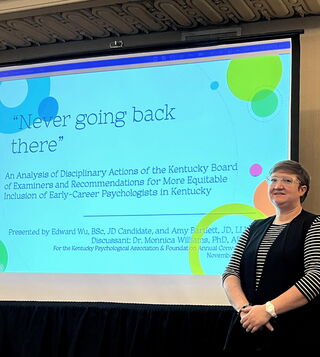Psychology
Opposing Voices in Psychology
A Personal Perspective: Robust debate is essential for improving our systems.
Updated December 13, 2023 Reviewed by Lybi Ma
Kentucky – home of the Kentucky Derby, Louisville Slugger, bourbon, and Muhammad Ali. It is a place full of wonderful food, culture, and rolling hills. I lived in Kentucky for five years and taught at the University of Louisville, where I became the first woman of color to gain tenure in the psychology department’s 108-year history. Although I live in Canada now, I love coming back to Kentucky.

Kentucky is also a place of contradictions. It is intensely segregated by racial lines. It has an identity crisis – they can’t decide if they are Southern or Midwest. And there is a joke here that Kentucky is the only state that joined the Confederacy after the Civil War. When I worked at the university, I had to walk past a 70-foot monument to fallen Confederate soldiers. They’ve taken it down since I left, and I am glad that no Black students or faculty need to be assaulted or insulted by that mammoth macroaggression any longer.
Imagine my surprise when I was invited by the Kentucky Psychological Association, KPA, to give a half-day workshop on psychedelics. For some background on this in 2019, I organized a training in Louisville for therapists of color on how to use MDMA to treat PTSD. This was well-attended, with participants flying in from all over the country and even a few internationals, but we could not get any locals to participate, despite extensive community outreach. (Some years ago there was a CIA-funded project that was using Black men as guinea pigs for psychoactive drug research in Lexington, but that is a story for another day.)
The half-day workshop was a success by all indicators – a full house, 150 participants all engaged, with lots of positive feedback afterward. The second talk was the one my students had submitted based on a project we had been working on for six months about the state licensing board and equitable protections for early-career psychologists. We conducted an analysis showing that psychologists who caused severe harm or engaged in grave ethical violations always had their licenses suspended or revoked. But, those who committed lesser offenses were subject to almost random means of punishment. Also, early-career psychologists appeared to have lesser offenses but more punishments, although the numbers were not large enough to make solid statistical conclusions for most of those comparisons.
What really stuck out were the first-hand accounts of psychologists who had had interactions with the state licensing board, most of whom had done nothing wrong. They described it as horrible, Draconian, unfair, and ridiculous. But more concerning was the trauma they expressed.
When one psychologist had been asked how it affected him, he was moved to tears. “Oh my goodness, I lost so much sleep. I could cry about it, like, sorry. It literally feels like I have trauma from it.”
I had reached out to several members of KPA about the topic in advance of our scheduled talk to see if anyone might be interested in working to help advocate for improvements to the inequitable systems that traumatized so many early career professionals and a number of seasoned ones as well. There we as little interest and, interestingly, a notable bit of fear. I figured our talk would be a bust. Only 15 people had signed up.
“At least this will be a good experience for my students,” I thought, who had traveled with me from Canada to present in this very different cultural milieu. Edward Wu was an Asian law student from Toronto, and Amy Bartlett was an organizational lawyer originally from New Brunswick working on her doctorate in psychedelics and spirituality. Neither had ever been to Kentucky, and they weren’t sure what to expect. I was excited to show them my old stomping ground.
I was shocked to learn our presentation had been cancelled.
I got a weird feeling that something was wrong when I received a cryptic email from the KPA leadership, wanting to review our slides and chat. The email said, “I understand it’s likely to be a challenging talk, and was hoping to have some time to think about it beforehand.” I wasn’t sure what to make of this. Challenging? On the phone, they dropped the bomb. They were canceling our talk.
A confidential preliminary version of the report to accompany our talk was leaked a week beforehand and had been circulated. A few of the licensing board members had seen it and were furious. They demanded that the event be canceled and made threats of legal action if we were allowed to proceed. And they didn’t want anyone getting credits for attending.

Surely, they could understand that robust debate is essential for improving our systems. My students were crestfallen. For Edward, this was his first conference presentation. He was ecstatic to present the project he had worked so hard on and discuss the results. All his time, effort and money felt wasted. “I felt like our paper and our voices were being silenced,” he said.
In the end, I convinced KPA leadership to allow us to give our talk to some of their board members as a private event, but not for the conference participants. I suggested that the members of the licensing board could attend as well, but none showed up.
In the end, it became clear that systems of power and privilege will go to great lengths to censor opposing voices, even if it is in no one’s best interest. And this is an even bigger taboo than psychedelics.
References
More work needs to be put into understanding systems of privilege and oppression. See Frontiers for a special issue entitled: Power, Discrimination, and Privilege in Individuals and Institutions.
Faber, S., Wu, E., & Bartlett, A. (2023). Abuse of power in disciplinary actions of a state psychology licensing board: Inequitable outcomes and early career psychologists. Frontiers in Psychology: Forensic and Legal Psychology, 14. https://doi.org/10.3389/fpsyg.2023.1184528
Pedrotti, J. T., & Burnes, T. R. (2016). The new face of the field: Dilemmas for diverse early-career psychologists. Training and Education in Professional Psychology, 10(3), 141-148. https://doi.org/10.1037/tep0000120
Kirkcaldy, H., van Rensburg, E., & du Plooy, K. (2022). “Under the sword of Damocles”: psychologists relate their experience of a professional misconduct complaint. Ethics & Behavior, 32(5), 401-412.
Woody, R. H. (2016). Psychological safety for mental health practitioners: Suggestions from a defense lawyer. Psychological Injury and Law, 9(2), 198–202. https://doi.org/10.1007/s12207-015-9239-x




